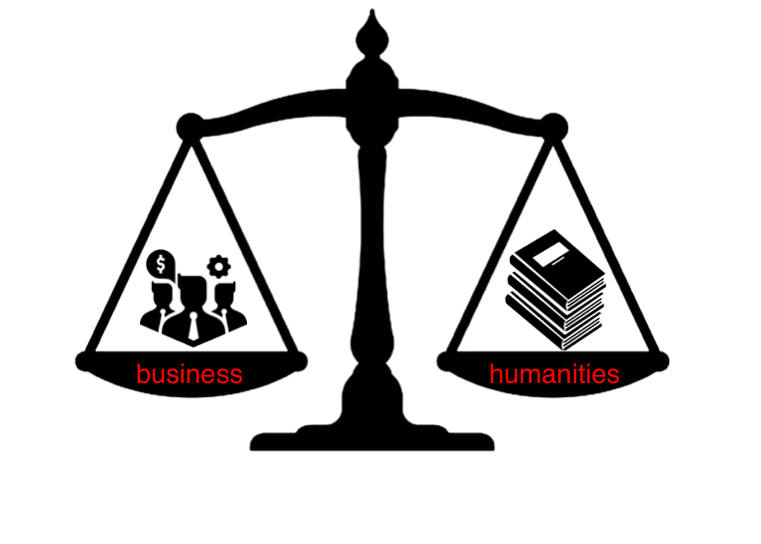
In an ever-modernizing world, where financial success seems to have become the definition of overall success, and the expectations from parents have been increasing, it seems that some of the more “artistic” or “less practical” college majors have experienced a decrease in the number of students choosing to major in them. This could be attributed to a variety of different causes including parents’ expectations, the perhaps less likely chance at financial success and lifestyle, as well as the stigma around seeming less intelligent.
Currently, in the US, only 393,000 of all 1,718,000 bachelors degrees awarded in 2011 were “impractical” or humanities and arts-based majors such as Art and Performance, English, History, Humanities, Philosophy, etc. Meanwhile, the rest of the 1,325,000 degrees or approximately 77% of all degrees were awarded in Business, Science, Mathematics and Statistics, Communications and Journalism, Law, Engineering, Health, and Politics, seemingly practical professions. This is a stark comparison in 406,000 bachelors degrees in the “impractical” sections, and 520,000 degrees or 56% of total degrees went to the “practical” professions.
In order to investigate the reasoning behind this 21% increase in “practical” professions and the consequent 21% decrease in “impractical” professions, I asked current college students or graduates about how they decided upon their college majors and if they felt any pressure to choose or disregard certain majors.
Ena A, who is currently a senior at Stanford majoring in English Literature and minoring in Medieval Studies admits that it “took [her] a long time to decide upon English as a major.” She states that during her “first two years at Stanford, [she] mostly took natural science and engineering related classes,” and she attributes this to the fact that “most people around me were doing it” and that she “forgot that [she] was allowed to do something different.” She also acknowledges that she “had a warped view of what constitutes something ‘hard’ [and that while knowing that she] wanted to study something challenging and difficult, [she] was convinced that only through engineering [she] would be able to do that.” However, “it’s [still] hard for [her] to pinpoint exactly why [she felt pressure to major] in anything practical.” She believes that this trend of practical majors, “mostly has to do with financial incentives. [And] engineering majors can easily get jobs after graduation that’ll earn them a lot of money.” But, in the same way, she thinks that “certain majors lead to more obvious (and perhaps easier-to-obtain) jobs, making them at first glance, more practical.” This is perhaps the reason that many students choose more practical jobs over others, simply because they seem easier to achieve financial success, but Ena thinks that “humanities majors can also achieve financial success, they’ll get there through a more circuitous path, perhaps, but it’s certainly not impossible.” This decision was something difficult for Ena, and she acknowledges the overall difficulty in choosing a major, but in the end, it was important for her to choose English because it focused on “reading and writing (which she loved).”
Muti J is a USC graduate with a degree in Business Administration. He was very open about the fact that he knew “he [had] a passion [for] running and managing business ventures,” adding he has known since he was young that he “enjoyed making decisions and leading teams,” and “so choosing Business Ad. to major in college was natural for [him].” He says that for him personally he “didn’t feel any pressure choosing [his] college major because [he] knew what [he] was passionate about and what [he] wanted to achieve in life.” But, he also recounts that he “he did have friends back in high school who struggles with deciding majors,” primarily for the reason that “what they wanted to learn in college and achieve in life wasn’t on par with what their parents wanted for them.” He also acknowledges that to his understanding “students choosing ‘practical’ majors has always been the trend, and it’s often the trend is fueled by their parents’ influence” which are consistent with connecting “doctors, lawyers, and management desk jobs are going to them ‘the good life.'” However, at the same time, he believes that “students choosing ‘impractical’ majors over practical’ majors is the real growing trend these days because of the media,” and that in this day and age, more “teenagers will gravitate more towards creative and liberal arts paths.” Additionally, Muti believes that “financial success is linked to how much risk and pressure you can take with the skill set that you’ve acquired from your major in college, “but that these traits for financial success have “no connection with what majors students choose to study.” A simple example of this would be a “practical major medical school graduate turned doctor [who makes] 250k annually or an ‘impractical’ major music graduate turned world-renowned artist [who makes] 10M annually.” Nonetheless, he adds that even if financial success might not be based on your major, financial stability might do. He believes that they have a connection “because there is a market price for professionals,” and certain ‘practical’ majors like “law, medicine or finance graduates are always on top because the world needs them to operate,” in contrast to the somewhat accurately named ‘impractical’ majors.
And so, it seems there is still a lot of debate and disagreement about if it is easier to be or perhaps possible to be financially successful with a specific major, but there does seem to be an agreement on the fact that often times students choose to go toward certain majors because of their promised financial stability. Either way, the most important thing, that is also emulated by both interviewees, is the importance of doing something that you truly love.